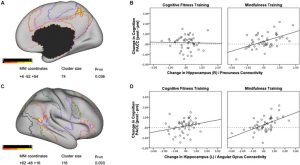Strengthen the Brain and Improve Cognition in Older Adults with Mindfulness
By John M. de Castro, Ph.D.
“mindfulness training, with its emphasis on present-focused attention and regulation of the habitual, reflexive tendencies of the mind, has the potential to enhance cognitive control operations in the elderly and the neural circuitry associated with it.” – Ruchika S Prakash
The aging process involves a systematic progressive decline of the body and the brain. Every system in the body deteriorates including cognitive function (thinking ability) and motor function with a decline in strength, flexibility, and balance. There is some hope as there is evidence that these declines can be slowed. For example, a healthy diet and a regular program of exercise can slow the physical and cognitive decline of the body with aging. Also, contemplative practices such as meditation, yoga, and tai chi or qigong have all been shown to be beneficial in slowing or delaying physical and mental decline. Research has found that mindfulness practices reduce the deterioration of the brain that occurs with aging restraining the loss of neural tissue. Indeed, the brains of practitioners of meditation and yoga have been found to degenerate less with aging than non-practitioners.
In today’s Research News article “Mindfulness Training Improves Cognition and Strengthens Intrinsic Connectivity Between the Hippocampus and Posteromedial Cortex in Healthy Older Adults.” (See summary below or view the full text of the study at: https://www.ncbi.nlm.nih.gov/pmc/articles/PMC8430251/ ) Sevinc and colleagues recruited healthy elderly participants (aged 65 to 80 years) who were evaluated as cognitively normal and randomly assigned them to receive either mindfulness training or cognitive fitness training. Mindfulness training was delivered in 8 weekly 105 minute sessions and was modelled after the Mindfulness-Based Stress Reduction (MBSR) program containing training in meditation, body scan, and yoga along with discussion and daily home practice. The cognitive fitness training consisted of 8 weekly 1-hour sessions of word finding and crossword puzzle solving along with home puzzle solving. They were measured before and after training for memory and cognitive performance. In addition, their brains were scanned before and after training with Magnetic Resonance Imaging (MRI).
They found that in comparison to baseline the group that received mindfulness training had significant increases in cognitive performance, primarily due to episodic memory improvement, while the cognitive fitness training group did not. The brain scans revealed that the mindfulness group had increased functional connectivity between the hippocampus and the angular gyrus. Additionally, the improved cognitive performance after mindfulness training was associated with increased connectivity between the precuneus and the hippocampus.
The findings suggest that mindfulness training improves cognition in cognitively intact elderly individuals. This may be why mindfulness training has been shown to reduce age related cognitive decline and dementia. The results also suggest that these improvements in cognition may be related to changes in the connectivity of the brain. The observed changes produced by mindfulness training were in the connectivity between the hippocampus and the precuneus and between the hippocampus and the angular gyrus. These are structures included in what is known as the brain’s default mode network, which is known to have decreased activity in association with age-related cognitive decline. So, the improved connectivity may indicate that mindfulness training protects the brain from deterioration associated with aging and this may be responsible for improved cognition in the elderly.
So, strengthen the brain and improve cognition in older adults with mindfulness.
“recent research suggests about how mindfulness meditation practice may help keep aging brains fit and functional.” – Grace Bullock
CMCS – Center for Mindfulness and Contemplative Studies
This and other Contemplative Studies posts are also available on Google+ https://plus.google.com/106784388191201299496/posts and on Twitter @MindfulResearch
Study Summary
Sevinc, G., Rusche, J., Wong, B., Datta, T., Kaufman, R., Gutz, S. E., Schneider, M., Todorova, N., Gaser, C., Thomalla, G., Rentz, D., Dickerson, B. D., & Lazar, S. W. (2021). Mindfulness Training Improves Cognition and Strengthens Intrinsic Connectivity Between the Hippocampus and Posteromedial Cortex in Healthy Older Adults. Frontiers in aging neuroscience, 13, 702796. https://doi.org/10.3389/fnagi.2021.702796
Abstract
Maintaining optimal cognitive functioning throughout the lifespan is a public health priority. Evaluation of cognitive outcomes following interventions to promote and preserve brain structure and function in older adults, and associated neural mechanisms, are therefore of critical importance. In this randomized controlled trial, we examined the behavioral and neural outcomes following mindfulness training (n = 72), compared to a cognitive fitness program (n = 74) in healthy, cognitively normal, older adults (65–80 years old). To assess cognitive functioning, we used the Preclinical Alzheimer Cognitive Composite (PACC), which combines measures of episodic memory, executive function, and global cognition. We hypothesized that mindfulness training would enhance cognition, increase intrinsic functional connectivity measured with magnetic resonance imaging (MRI) between the hippocampus and posteromedial cortex, as well as promote increased gray matter volume within those regions. Following the 8-week intervention, the mindfulness training group showed improved performance on the PACC, while the control group did not. Furthermore, following mindfulness training, greater improvement on the PACC was associated with a larger increase in intrinsic connectivity within the default mode network, particularly between the right hippocampus and posteromedial cortex and between the left hippocampus and lateral parietal cortex. The cognitive fitness training group did not show such effects. These findings demonstrate that mindfulness training improves cognitive performance in cognitively intact older individuals and strengthens connectivity within the default mode network, which is particularly vulnerable to aging affects.
https://www.ncbi.nlm.nih.gov/pmc/articles/PMC8430251/
